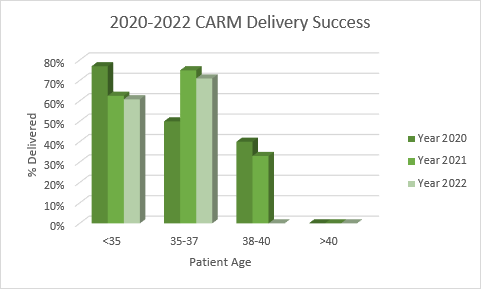Center for Advanced Reproductive Medicine
Having a baby can be one of life's greatest joys, but it's a joy that is denied many couples because of infertility. From accurate diagnosis of the causes of infertility to a variety of treatment options, the specialists at Cabell Huntington Hospital's Center for Advanced Reproductive Medicine can offer hope, and often, success for many infertile couples.
 Couples who are having difficulty conceiving a child can find help at Cabell Huntington Hospital's Center for Advanced Reproductive Medicine. Under the direction of William Burns, MD, and clinical embryologist Melissa Lay, RN, the center offers diagnostic testing for men and women, including assisted reproductive technology such as intrauterine insemination, in vitro fertilization, oral and injectable "fertility drugs" and surgery.
Couples who are having difficulty conceiving a child can find help at Cabell Huntington Hospital's Center for Advanced Reproductive Medicine. Under the direction of William Burns, MD, and clinical embryologist Melissa Lay, RN, the center offers diagnostic testing for men and women, including assisted reproductive technology such as intrauterine insemination, in vitro fertilization, oral and injectable "fertility drugs" and surgery.
Dr. Burns commonly treats patients with infertility caused by endometriosis, tubal scarring or blockage, polycystic ovary syndrome and other diseases associated with infrequent or irregular menstruation and ovulation. Couples in whom the male partner has suboptimal sperm production (male factor infertility) and female patients with cervical and uterine disorders interfering with fertility are also treated.
In Vitro Fertilization Laboratory
Cabell Huntington Hospital has a special in vitro fertilization laboratory in which the staff performs microscopic procedures such as sperm preparation for oocyte (egg) retrieval, embryo transfers and cryo-preservation of sperm and embryos. Two other special procedures to assist couples who are trying to have a baby include intracytoplasmic sperm injections for low sperm counts and assisted hatching, in which the egg shell is softened so it will implant in the uterus more easily.
Laboratory Treatment Options
Laboratory procedures available at the Center for Advanced Reproductive Medicine include:
- Oocyte (Egg) Retrieval: Removal of the eggs from the woman’s ovaries through ultrasound-guided needle aspiration.
- Intracytoplasmic Sperm Injection (ICSI): Injection of a single sperm into the substance of a single egg using high-powered microscopes and micro-instrumentation.
- Embryo Transfer: Placement of viable embryos (fertilized eggs) into the uterine cavity – this is typically done three to five days after the eggs are retrieved and inseminated.
- Embryo Cryopreservation: Freezing and saving for later use viable embryos not initially transferred to the woman’s uterus – with the availability of this technology not all viable embryos have to be transferred, thereby reducing the chances of high-risk triplet, quadruplet and higher-order multiple pregnancies.
- Assisted Hatching: Microscopic abrasion of the outer wall of the embryo, a process that may improve the embryo’s chances of successfully establishing a pregnancy.
Pregnancy Rate Exceeds National Average
The most recent data provided by the CDC is for the reporting year 2020. In 2020, there were 449 Assisted Reproductive Technology (ART) centers that reported pregnancy results. The CDC ART Success Rates for 2020 are 51.5% deliveries for patients <35 years old, 37% deliveries for patients aged 35-37, 23.5% deliveries for patients aged 38-40, and 8% deliveries for ages 40+.
For reporting year 2021, Society for Assisted Reproductive Technology (SART) success rates are 44.5% deliveries for patients <35 years old, 32.4% deliveries for patients aged 35-37, 20.2% deliveries for patients aged 38-40, and 9.6% deliveries for ages 40+.
The data below does not include donor eggs, but it does include frozen embryo transfers.
Cabell Huntington Hospital Center for Advanced Reproductive Medicine Success Rates for 2020-2022

More Information
MUSOM - Center for Advanced Reproductive Medicine
For an appointment with Dr. William Burns, the medical director of the Center for Advanced Reproductive Medicine, please call University Physicians and Surgeons Department of Obstetrics and Gynecology at 304.691.1400 option #1, or for other questions, please call 304.526.2602.
